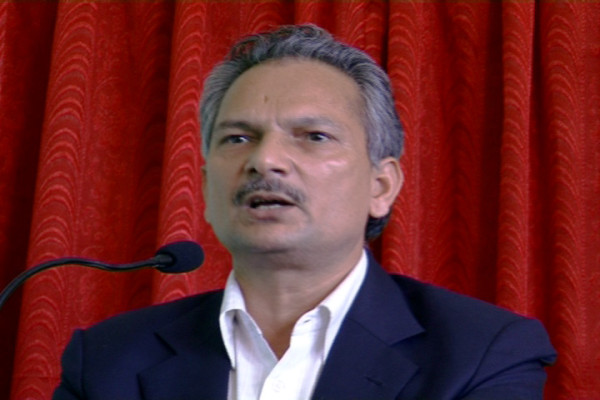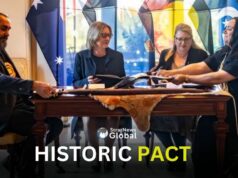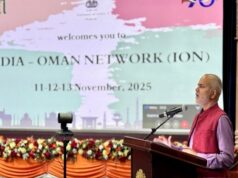
Nepal needs to enact a new constitution that will have a combination of “direct and inclusive democracy”, says Baburam Bhattarai, former prime minister of the Himalayan state.
In an exclusive chat with StratNews Global in Delhi, the veteran leader warned that ordinary Nepalis are getting increasingly disillusioned with the current KPS Oli dispensation (Communist Party of Nepal-Unified Marxist Leninist + Nepali Congress) that has failed to bring economic development and has even led to rise in corruption and joblessness.
Bhattarai – a fierce Communist leader of his time – said Nepal does not want monarchy to make a comeback and people there want a democratic nation for which they have fought for years and struggled for decades.
Political Failures
“Nepali Congress and the Communist factions led by Oli and (ex-PM Pushpa Kamal Dahal) Prachanda have been leading the government by turn again and again, but they have not been able to deliver. There has been rampant corruption and economic growth has been very sluggish,” he said.
“Because of lack of employment, thousands of youth everyday take flights to foreign countries in search of jobs. So these leaders have failed. That is the truth. But that doesn’t mean democracy has failed in Nepal. It only means we need a change of leaders and we need a change of parties.”
Nepal has been witnessing pro-monarchy demonstrations for the first time since its abolition in 2008. In March, the capital Kathmandu witnessed large-scale demonstrations by pro-monarchy groups that led to clashes in which two people were killed and several injured. The protests were organised by supporters of the former king Gyanendra Shah.
“The protests only had a few thousands and people can always protest in a democracy and such protests are normal. And if they break the law, then the government uses force at times, but this was not out of control and only a few thousands participated… The main issue here is there is some lacunae in our constitution making process,” said Bhattarai.
Constitutional Issues
He pointed out that “I was personally was involved in the making of the Constitution, and that time our proposal was given the diversity of Nepal, its ethnicity, language, culture, religion and others, for that having a directly elected presidential system, educated president, would provide stability, and if we have a fully proportional parliament where all the ethnic groups, women, Dalits are represented, then this will be a good combination of direct democracy and inclusive democracy.”
Nepal became a federal democratic republic in 2008 but got its first Constitution only in 2015. This constitution was drafted after a long and complex process following the end of the civil war. Bhattarai believes the 2015 Constitution was a “compromise”.
“So there has been constant instability. No government, no party is able to muster a comfortable majority after the elections. Therefore, there have been frequent changes in the government and because of other issues, like lack of good governance and lack of economic delivery, and thus people, who fought for democracy in Nepal, have suffered,” he said.
“The solution is, amend the Constitution and let’s improve our democratic system with a combination of direct and inclusive democracy. This has been our stand and I can see sooner or later people will go for that.”
Revolving Door Governments
Nepal has been witnessing rapid change in governments in the past five years. In July 2024, Oli came back to power for his fourth term as prime minister, turning the tables on the Prachanda. This was done by Oli striking a deal with the opposition Nepali Congress (NC) led by Sher Bahadur Deuba.
Under the present arrangement, Oli will step down from the PM’s post in 2026 and Deuba will take over till the next elections in 2027.
“I was the founder of the Maoist Party of Nepal. It was founded to organise an insurgency against an autocratic monarchy. After that got over and when the Constitution was completed then we abandoned that party and we were trying to build an alternative democratic party, which we called Socialist Party of Nepal Naya Shakti. This is now being taken forward.
“People in Nepal are looking for a change. In the next few years, an alternative political formation will materialise in Nepal, which will provide good governance and deliver on the economic front,” he said rather optimistically.
Bhattarai, 70, also said by 2027 elections he will be able to turn his Naya Shakti party into an alternative force, which can “lead the country, provide good governance and deliver and make a difference.”
“People are joining hands and building a critical front that could be a viable alternative. We are offering a democratic alternative. For some time I had the opportunity to lead it, I was the finance minister and then prime minister. My record has been quite positive and appreciated by the people,” he claimed.
Relations With India
Bhattarai says it is crucial for Nepal to have robust ties with India in order to achieve economic growth. Bilateral ties hit an unprecedented low when the current PM Oli, who was then serving his second term, changed Nepal’s political map in 2020 by including Kalapani, Lipulekh, and Limpiyadhura, even though these are claimed and held by India.
“Nepal has been historically left behind in the economic development process. And, for that good bilateral relation with India matter. But unfortunately, because of some historical issues that were left behind like the border issue, our relation with India for some time now has slowed down and misunderstandings have crept in,” said Bhattarai.
He said he raised the matter with Indian officials and has urged both the prime ministers to thrash out all legacy disputes.
“(Political) stability in Nepal would benefit India also. India is a rising power so naturally having instability in its neighbourhood will adversely impact Delhi,” he said, adding, it will be incorrect to assume that India tacitly supports the restoration of monarchy in Nepal.
“Monarchy in Nepal has always been autocratic. It has always defied democratic norms. Whenever people wanted multiparty democracy, the monarchy denied it. In Nepal it has always been an absolute monarchy,” he explained.
“What I would like to make very clear is that religion, culture and monarchy are different things. Monarchy is a form of state which is anti-democratic and autocratic. If someone imposes monarchy in Nepal, it will be a disaster for us, for India and for the entire South Asian subcontinent. India does not want monarchy in Nepal.”
He maintained that for Nepal, India will always remain its most important partner compared to China.
“We need to improve our relations with India. About 68% of our trade takes place with India and only about 14% with China, and around 10-15% with the U.S. and others. So in that sense, until and unless we have a good relationship with India, our economy cannot be developed,” he underscored.
In his view, India and China’s decision to resume the Kailash Mansarovar Yatra is a positive move, but Nepal should have been involved because the route cuts through the Lipulekh pass, which remains disputed.
“I think all the three sides should have sat down and discussed this since this is a contentious issue. Because the border in the Western area has not been demarcated … There is a dispute so the solution is to sit down, go through the papers, the maps and solve it. But without resolving, if you do it unilaterally, that will naturally create friction and it doesn’t benefit anybody. Only thing is when the area or the land is disputed, then you should sit down, you shouldn’t take unilateral action,” he said.




